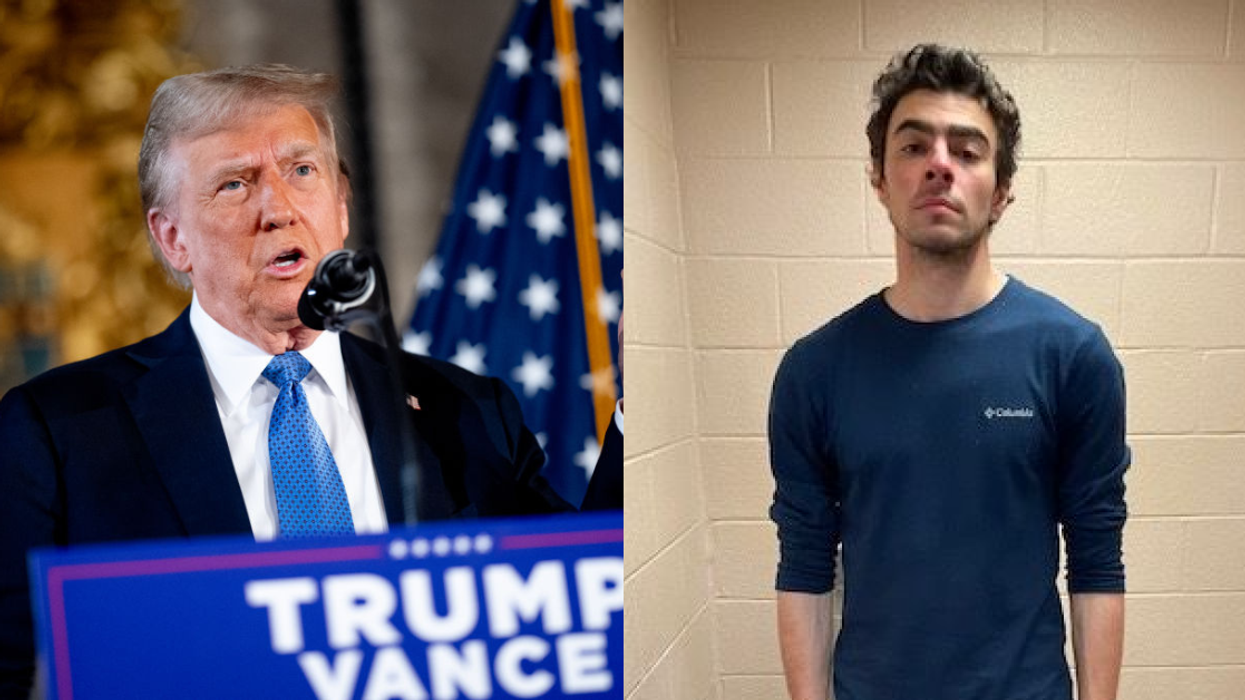President-elect Donald Trump was criticized after calling out those who "like" the UnitedHealthcare CEO shooting suspect Luigi Mangione, saying that it's a "sickness"—only for people to draw a parallel to Trump's own supporters.
Mangione was charged last Monday in Manhattan with second-degree murder, forgery, and three firearm-related offenses. The charges stem from the fatal shooting of Brian Thompson in Midtown Manhattan last week. The New York Police Department had previously released images of Mangione in connection with the incident.
Reports suggest that Mangione underwent back surgery and may suffer from chronic back pain. Authorities revealed the suspect had written a manifesto criticizing the health insurance industry. Public reactions to Thompson’s killing have varied widely, ranging from condemnation to indifference, and even celebratory responses in some corners.
Mangione's actions appeared to be fueled by anger toward the health insurance industry and broader frustrations with “corporate greed.”
Critics of UnitedHealthcare have pointed out its controversial practices, including the use of algorithms to deny care, and noted that it has the highest claim denial rate among health insurers.
And according to Trump, it boggles the mind that people could be more sympathetic to Mangione than the "cold-blooded" killing of Thompson:
“I think it’s really terrible that some people seem to admire him, like him. And I was happy to see that it wasn’t specific to this gentleman that was killed. It’s just an overall sickness as opposed to a specific sickness."
“It was cold-blooded, just a cold-blooded, horrible killing. And how people can like this guy is — that’s a sickness, actually. That’s really very bad. The way it was done. It was so bad. Right in the back. Very bad.”
"A thing like that you just can't believe that some people—and maybe it's fake news, I don't know—it’s hard to believe that that could even be thought of, but it seems there’s a certain appetite for him. I don’t get it.”
You can hear what he said in the video below
However, many pointed out that Trump isn't one to talk given the fanaticism displayed by his own supporters.
Many MAGA supporters have firmly embraced Trump's falsehoods and conspiracy theories, believing that the 2020 election was stolen, COVID-19 is a Chinese bioweapon, and the January 6 insurrection—when a mob of Trump's followers stormed the U.S. Capitol over baseless claims of election fraud—was orchestrated by "Antifa," a left-wing anti-fascist movement.
The movement has also been marked by homophobic, sexist, and racist rhetoric that has raised concerns about inciting violence. Its antagonism toward mainstream media is a defining trait, with many adherents viewing traditional outlets as inherently biased against them or even complicit in spreading lies on behalf of perceived enemies.
This distrust has made the movement particularly susceptible to misinformation and far-fetched conspiracy theories promoted by MAGA-aligned media and leaders, including the claim that Trump—convicted on 34 felony counts—is the victim of a "political witch hunt."
Trump—who infamously claimed he could "shoot someone on Fifth Avenue" and not lose supporters—was swiftly called out.
It's no stretch to understand why some people might "like" or even "admire" Mangione, as Trump claimed.
Last week, New York Democratic Representative Alexandria Ocasio-Cortez had a blunt assessment about the healthcare industry in remarks about the fatal shooting, noting that the nation's privatized healthcare system is an act of "passive violence" against the American people.
Ocasio-Cortez pointed out that many Americans have "had either their lives destroyed from a devastating healthcare diagnosis that completely upended their financial life or know someone whose life was, in fact, taken from a diagnosis."
She emphasized "that this collective American experience, which is so twisted to have in the wealthiest nation in the world, all of that pain that people have experienced is being concentrated on this event."
Moreover, she noted that critics "need to understand that people interpret and feel and experience denied claims as an act of violence against them." Acknowledging that people shouldn't necessarily condone violence, she said "we need to understand that extreme levels of inequality in the United States yield high degrees of social instability.”














 @DuncanCecil/X
@DuncanCecil/X @@realDonaldTrump/Truth Social
@@realDonaldTrump/Truth Social @89toothdoc/X
@89toothdoc/X @xray_media/X
@xray_media/X @CHRISTI12512382/X
@CHRISTI12512382/X
 @sza/Instagram
@sza/Instagram @laylanelli/Instagram
@laylanelli/Instagram @itssharisma/Instagram
@itssharisma/Instagram @k8ydid99/Instagram
@k8ydid99/Instagram @8thhousepath/Instagram
@8thhousepath/Instagram @solflwers/Instagram
@solflwers/Instagram @msrosemarienyc/Instagram
@msrosemarienyc/Instagram @afropuff1/Instagram
@afropuff1/Instagram @jamelahjaye/Instagram
@jamelahjaye/Instagram @razmatazmazzz/Instagram
@razmatazmazzz/Instagram @sinead_catherine_/Instagram
@sinead_catherine_/Instagram @popscxii/Instagram
@popscxii/Instagram
